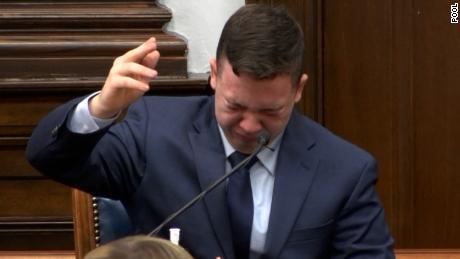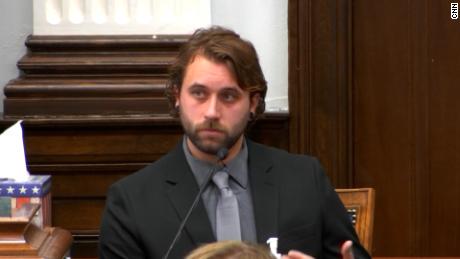(CNN)When jurors in the homicide trial of Kyle Rittenhouse begin deliberations, expected early this week, the young man's actions during a night of unrest on the streets of Kenosha, Wisconsin, last year will not be in dispute.
Rittenhouse, then 17, shot at four people with a semiautomatic rifle, killing two of them and wounding another. Nearly all of it was captured on video that was analyzed frame-by-frame over the last two weeks.
The prosecution has sought to portray Rittenhouse as a teenage vigilante who illegally possessed the gun and acted criminally and recklessly.
Defense lawyers -- backed up by the defendant's riveting and emotional testimony -- argued that he acted in self-defense.
After closing arguments, set for Monday, the jury will get the case.
The panel will consider five felony counts and a misdemeanor weapons charge against Rittenhouse. Using an AR-15-type rifle, he killed Joseph Rosenbaum, 36, and Anthony Huber, 26, and wounded Gaige Grosskreutz, 27, during street demonstrations over the police shooting of Jacob Blake.
Here are the counts the jury will weigh after Kenosha County Circuit Judge Bruce Schroeder instructs them on the law:
First-degree reckless homicide, use of a dangerous weapon
Count 1 states that Rittenhouse recklessly caused the death of Rosenbaum under circumstances that showed utter disregard for human life.
The judge denied a prosecution request for the jury to also be instructed on second-degree reckless homicide.
Rittenhouse testified he acted in self-defense when he fatally shot Rosenbaum after the man threw a plastic bag at him and chased him.
"I didn't do anything wrong. I defended myself," he testified.
Under cross, Rittenhouse said that he knew Rosenbaum was unarmed. He said he pointed his rifle at Rosenbaum in an attempt to deter him and acknowledged that was dangerous.
"If I would have let Mr. Rosenbaum take my firearm from me, he would have used it and killed me with it and probably killed more people," he testified.
Rittenhouse broke down in tears at one point, leading to a short break.
"I think it was a game changer to put him on the stand," CNN legal analyst Joey Jackson said. "Number one, you humanize him... More important, number two, he explained his uses of force."
Rittenhouse's testimony couldn't have been scripted any better, criminal defense attorney Mark Eiglarsh said.
The "biggest issue" is whether the jury finds Rittenhouse credible, he told CNN. "Secondly, do they believe then that it equals he reasonably feared death or great bodily harm?"
Wisconsin law allows the use of deadly force only if "necessary to prevent imminent death or great bodily harm."
"Whether he engaged in self defense and did so reasonably and thought his life was in immediate danger ... that's what the jury has to assess ultimately," Jackson said of Rittenhouse.
Prosecutors also requested the jury be given instruction on provocation. They argued Rittenhouse provoked Rosenbaum by raising his gun and pointing it at somebody, which led to the victim running after him.
The judge agreed to allow that the panel consider whether Rittenhouse provoked Rosenbaum into attacking him -- thus negating self-defense.
Ellie Honig, a CNN senior legal anaylst and a former prosecutor, said the provocation instruction was an important win for the prosecution.
Honig said the instruction allows prosecutors to argue "the defendant went too far, used deadly force when it wasn't reasonably necessary" and that he "provoked the attack, and hence cannot argue self-defense."
First-degree recklessly endangering safety, use of a dangerous weapon
Count 2 states that Kyle Rittenhouse recklessly endangered the safety of Richard McGinniss -- a journalist with the conservative Daily Caller -- under circumstances that show utter disregard for human life.
The state asked that the jury also be instructed on second-degree recklessly endangering safety. Schroeder said he was inclined to give the additional instruction on the lesser charge.
The judge told Rittenhouse that presenting lesser offenses lowered the possibility of a second trial but increased the risk of a conviction.
Allowing jurors to weigh less serious charges could help the prosecution.
"A lot of times ... the jury gets into a heated discussion about whether he's guilty or not guilty of intentional conduct," said CNN legal analyst and former prosecutor Paul Callan.
"And they compromise on a lesser charge when they have one available. If they don't have one available, it's either guilty of one of the higher charges or not guilty."
First-degree intentional homicide, use of a dangerous weapon
Count 3 states that Rittenhouse did cause the death of Huber, with intent to kill him. It's the most serious charge he faces, with a mandatory life sentence. Huber swung his skateboard at Rittenhouse after Rosenbaum was fatally shot.
Prosecutors asked that the jury also be instructed on second-degree intentional homicide, first-degree reckless homicide and second-degree reckless homicide.
Defense attorneys objected to second-degree reckless homicide. The judge said he "embraced" the defense's argument. But he will likely allow lesser charges of second-degree intentional homicide and first-degree reckless homicide.
"I think the jury is going to want to hold him responsible for something in this case," former prosecutor Mark O'Meara said. "Then giving the lesser is an opportunity for the jury to hold him responsible but at a much lower charge than the intentional homicide or even the reckless homicide."
First-degree recklessly endangering safety, use of a dangerous weapon
Count 4 states that Rittenhouse did recklessly endanger the safety of an unknown male, referred to as "jump kick man" in court, under circumstances that show utter disregard for human life.
The man jumped at Rittenhouse at one point, trying to kick him and the teen opened fire. "I thought if I were to be knocked out, he would have stomped my face in if I didn't fire," he said.
Rittenhouse fired at the man twice and missed.
Attempted first-degree intentional homicide, use of a weapon
Count 5 states that Rittenhouse attempted to cause the death of Grosskreutz, with intent to kill him.
After shooting Huber, Rittenhouse testified, he saw Grosskreutz lunge at him and point a pistol at his head. Rittenhouse shot him, he testified. Grosskreutz was wounded.
Grosskreutz testified that he pulled out his own firearm because he believed Rittenhouse was an active shooter.
Grosskreutz said he and a crowd followed Rittenhouse, who had just fatally shot another man. Rittenhouse fell to the ground, fired twice at an unknown person and then fatally shot Huber.
Grosskreutz, just feet away, put his hands in the air, videos show. He testified he then saw Rittenhouse rerack his weapon -- a motion that loads it for gunfire.
Prosecutors asked for lesser charges of attempted second-degree intentional homicide, first-degree reckless endangerment and second-degree reckless endangerment. Schroeder said he was inclined to agree with the prosecution.
Possession of a dangerous weapon by a person under 18
Count 6, a misdemeanor, states that Rittenhouse was under 18 years old with a dangerous weapon.
Aside from the evidence presented at trial and the instructions on the law, the personal views of jurors and the polarizing nature of the case could also come into play.
"It's a very difficult case," said Laura Coates, a CNN senior legal analyst and a former federal prosecutor. "You cannot extract and divorce from the political, the sociological, the cultural, the actual everyday conversations ... It's very difficult to just look at this from the idea of -- was this person entitled to self-defense? There are so many different aspects of it. The jury is going to have to whittle that down."
"What" - Google News
November 14, 2021 at 04:01PM
https://ift.tt/3cbKXik
Here's what the jury in Kyle Rittenhouse's trial will have to weigh - CNN
"What" - Google News
https://ift.tt/3aVokM1
https://ift.tt/2Wij67R
Bagikan Berita Ini




















0 Response to "Here's what the jury in Kyle Rittenhouse's trial will have to weigh - CNN"
Post a Comment